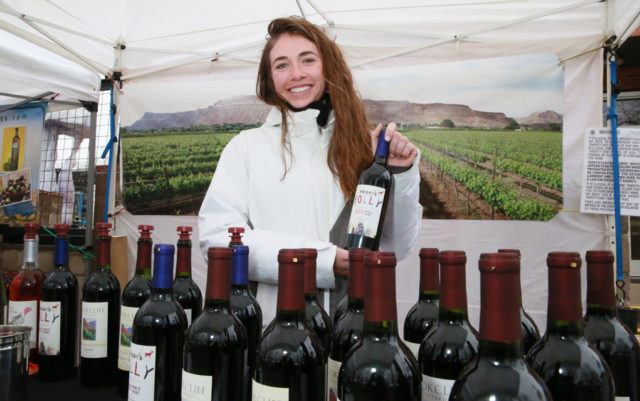
Walking toward 13th Street on the first Saturday of the Boulder County Farmers Market, a palpable buzz filled the chilly air. We all missed the place, judging by the crowds cruising the food court and the limited early season offerings of arugula, beets, winter carrots, chives, greenhouse tomatoes, kale, pea shoots and spring onions.
It was great to greet folks I hadn’t seen since the final market day of 2017. I overheard serious discussions about the best way to prepare sweet over-wintered spinach, one of the season’s first greens.
Like professional baseball’s sacramental opening day of the season, the first Saturday market is a spring ritual infused with hope. However, standing in the middle of the hubbub I wondered if Boulder’s nationally acclaimed market would lose its glow if it was open year-round. If Boulder had a permanent food-centric market hall we could visit on any given Saturday — or even every day of the week — would this Saturday in April still be a festive occasion?
I’ve been writing about the possibility of a year-round market in Boulder for several decades. I may write about it for several more. There are recent proposals to create a market hall in the same block as the current market site in an existing or new building. It would be designed to complement the April-to-November Boulder County Farmers Market.
It seems like a no-brainer for Boulder to have a market hall — a year-round public market downtown with a demo kitchen, event space and room for classes and tastings showcasing Boulder County’s array of tasty goods.
There is a complicated reason why Boulder lacks a year-round market like Pike Place in Seattle or even a cool food hall like Avanti, Denver Central Market, The Source and Zeppelin Station in Denver, and Aurora’s new Stanley Marketplace.
Boulder doesn’t have any large old brick factories or a train terminal sitting around waiting to be rehabilitated into cool public gathering spaces. The impediments include winter weather, a short growing season, high real estate costs and finding funding sources and business partners. Also, Boulder has famously moved at a glacial pace in considering major new public projects over the years.
At that first market, I hung out with the farmers, chefs and folks who work the event. When I asked them about the viability of a year-round facility the reaction was mixed. One farmer wasn’t sure that he wanted to do it. “By the time we get to November, we need to take a break and focus on other projects and maintenance on the farm,” he said. Another farmer suggested a monthly winter farmers market but there is not an attractive, affordable venue available in Boulder.
One market merchant said that a 12-month venue would be good for farmers and would encourage them to grow more winter greenhouse crops and produce preserved, canned and fermented foods using local crops.
Boulder’s winter weather is a factor, although locals are notoriously active even when there is a foot of snow on the ground.
As I left the market that Saturday, it struck me that a year-round market hall in Boulder would mean we wouldn’t have to suffer the sense of loss that comes with the final Boulder County Farmers Market each season.
Comments? Send them to: [email protected].
Local food news
If you live in Boulder, consider planting an extra row for fighting hunger this summer. Fresh Food Connect will pick up vegetables from you and your neighbors. boulderfoodrescue.org/fresh-food-connect.
“Wrapping your head around just how many coffee roasters are doing good work in booming Denver right now could take a while — there’s Middle State, Corvus, Huckleberry, Commonwealth; Boulder’s got Ozo, and Boxcar, too,” according to Food and Wine magazine, which named Lakewood’s Sweet Bloom Coffee Roasters as Colorado’s best coffee roaster.
The last vestige of one of Boulder’s pioneering natural foods brands has faded into history. WhiteWave was founded by Steve Demos in Boulder in 1977. I remember him delivering fresh tofu to a handful of Boulder restaurants and markets that knew what tofu was. WhiteWave Foods went through various transitions before the French conglomerate Danone recently bought the company for $12.5 billion. It was renamed DanoneWave. Recently DanoneWave changed its name to Danone North America.
Taste of the week
When you have “Championship” in your name you had better serve some wonderful barbecue. The smoky perfume certainly beckoned when I walked into GQue Championship Barbecue in Westminster. The meats are slow-smoked in-house over Missouri hickory every day. In true barbecue tradition, when they run out of smoked meats that’s it until the next day. I was impressed with the ribs because the meat didn’t fall off the bone — a sure sign of overcooked pork. Instead, the meat had some chew with an infused smokiness that wasn’t overbearing and woody. I was also happy to see the two sweet, smoky tomato-molasses barbecue sauces on the side and not on the meats, including some softly shredded pork. The plate came with Texas toast, a pickle spear and house-pickled onions. (GQue will be serving at the inaugural Denver BBQ Festival during the Father’s Day weekend.)
Words to chew on
“Many excellent cooks are spoiled by going into the arts.” — Paul Gauguin
John Lehndorff is the former executive director of the American Pie Council. He hosts Radio Nibbles on KGNU. Listen to podcasts at news.kgnu.org/category/radio-nibbles














